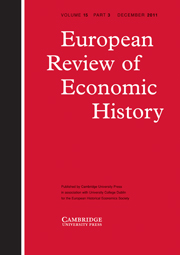Crossref Citations
This article has been cited by the following publications. This list is generated based on data provided by
Crossref.
Lübbers, Thorsten
2008.
Shareholder value mining: Wealth effects of takeovers in German coal mining, 1896–1913.
Explorations in Economic History,
Vol. 45,
Issue. 4,
p.
462.
Burhop, Carsten
and
Luebbers, Thorsten
2008.
Cartels, Managerial Incentives, and Productive Efficiency in German Coal Mining, 1881-1913.
SSRN Electronic Journal,
Bayer, Christian
and
Burhop, Carsten
2008.
Corporate Governance and Incentive Contracts: Historical Evidence from a Legal Reform.
SSRN Electronic Journal,
Bayer, Christian
and
Burhop, Carsten
2009.
Corporate governance and incentive contracts: Historical evidence from a legal reform.
Explorations in Economic History,
Vol. 46,
Issue. 4,
p.
464.
Luebbers, Thorsten
2009.
Is Cartelisation Profitable? A Case Study of the Rhenish Westphalian Coal Syndicate, 1893-1913.
SSRN Electronic Journal,
Sarferaz, Samad
and
Uebele, Martin
2009.
Tracking down the business cycle: A dynamic factor model for Germany 1820–1913.
Explorations in Economic History,
Vol. 46,
Issue. 3,
p.
368.
Nanda, Anupam
and
Ross, Stephen L.
2012.
The Impact of Property Condition Disclosure Laws on Housing Prices: Evidence from an Event Study Using Propensity Scores.
The Journal of Real Estate Finance and Economics,
Vol. 45,
Issue. 1,
p.
88.
Bohn, Nicolai
Rabhi, Fethi A.
Kundisch, Dennis
Yao, Lawrence
and
Mutter, Tobias
2013.
Enterprise Applications and Services in the Finance Industry.
Vol. 135,
Issue. ,
p.
20.
Huang, Yu-Lin
Huang, Po-Hsian
and
Hsieh, Ching-Hsiang
2013.
Management of unexpected project risk events by the icss and dummy garch model.
Journal of Information and Optimization Sciences,
Vol. 34,
Issue. 4-5,
p.
261.
Tuinstra, Jan
and
in ’t Veld, Daan L.
2014.
Market-Induced Rationalization and Welfare-Enhancing Cartels.
The B.E. Journal of Economic Analysis & Policy,
Vol. 14,
Issue. 1,
p.
189.
Günther, Jens
2017.
Capital market effects around dividend announcements: an analysis of the Berlin stock exchange in 1895.
Accounting History Review,
Vol. 27,
Issue. 3,
p.
249.
Murray, John E.
and
Silvestre, Javier
2020.
Integration in European coal markets, 1833–1913†.
The Economic History Review,
Vol. 73,
Issue. 3,
p.
668.
Berninger, Marc
and
Seippel, Jakob
2022.
New Insights into the Profitability Effects of Cartels: A Propensity Score Matching Approach.
SSRN Electronic Journal ,
Beyer, Christian
2022.
Cartelization and firm performance in Upper Silesia 1880–1913.
European Review of Economic History,
Vol. 26,
Issue. 1,
p.
124.




